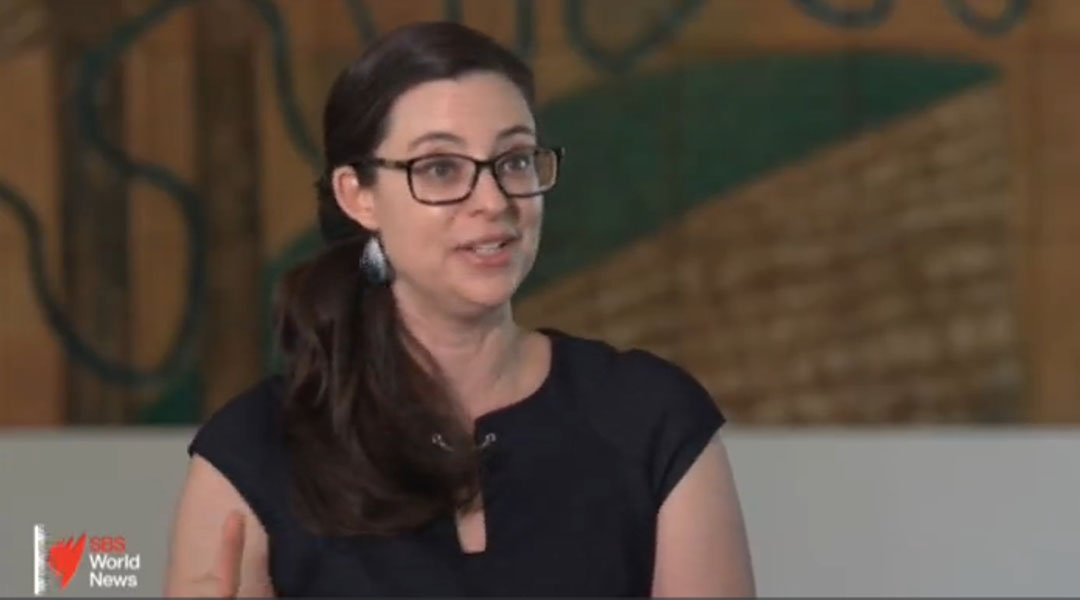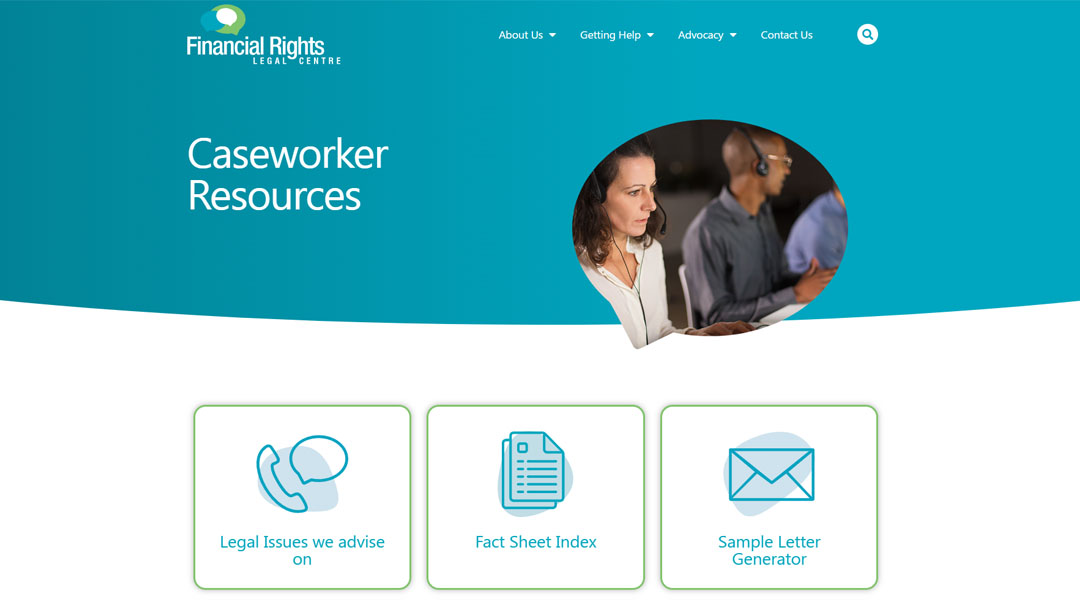Contents
- CEO announcement
- 2025 Federal Election
- Refreshed caseworker pages
- First Nations advocates call for super funds to end the harm and commit to mandatory customer service standards
- NSW strata reform
- First designated ‘super’ complaint lodged with ACCC to ban unsolicited selling
- Insurance code update
- Centrepay reforms announced
1. CEO announcement
After 25 years with the Financial Rights Legal Centre, Karen Cox will be stepping down as CEO. Ms Cox will remain at Financial Rights for the remainder of 2025 to allow for a smooth transition for the incoming CEO, for whom recruitment will begin shortly.
Chair Natalie Pozdeev thanked Ms Cox for her significant contribution not just to Financial Rights, but for her leadership in the broader consumer movement.

“Karen has been a pillar of the consumer movement for decades, championing not just the rights of consumers to get a fair outcome in disputes, but making financial services fairer and safer for all Australians” said Ms Natalie Pozdeev. “Under her stewardship, Financial Rights has grown from a small specialist centre of under 10 employees to a multi-service organisation that provides much needed supports to consumers in NSW and nationally”.
Ms Cox oversaw the expansion of services offered at Financial Rights, including the integration of legal assistance and financial counselling. Financial Rights supports NSW consumers through the National Debt Helpline and associated legal assistance, provides vital support for consumers through the national Insurance Law Service, and auspices the national Mob Strong Debt Help service for First Nations consumers.
Among Ms Cox’s most significant achievements was advocating for the elevation of credit regulation to the national level, bringing disparate and uneven state-based regimes to a level playing field. Karen was instrumental in the campaign for responsible lending obligations and a maximum interest rate for consumer lending, contributed to major improvements in consumer protection in personal insolvency and credit reporting, and pioneered a bankruptcy toolkit for lawyers and financial counsellors to get up to date advice for clients facing the prospect of bankruptcy. Karen was also the first witness to the Royal Commission into Misconduct in the Banking, Superannuation and Financial Services Industry.
Ms Pozdeev said: “Few people will forget Karen’s evidence as first witness to the Royal Commission into Misconduct in the Banking, Superannuation and Financial Services Industry, where she detailed the systemic misconduct endemic at the time, and the harm being sustained by Financial Rights clients”.
Ms Cox said: “After 25 years, it is time for me to start a new chapter. My time here at Financial Rights has meant a lot to me and I am very proud of how much we have achieved together. My successor will be taking charge of an organisation full of talented, passionate and committed people, who are ready to carry on our important work.”
The Board will shortly begin the process of recruiting a new CEO, and will look internally and externally. Further recruitment details will be published on our website.
2. 2025 Federal Election
This federal election, we are seeking 2 commitments from political parties:
Firstly, a fairer approach to general insurance, to help the 1.24 million Australians who are already insurance-stressed. Progress toward this can be made by:
- Increasing transparency in general insurance pricing and risk mitigation
- Increasing oversight and contestability of insurance premium pricing
- Addressing insurance affordability
- Removing the confusion in general insurance contributing to underinsurance, and
- Ensuring general insurers improve claims and complaints handling practices
Read the full insurance policy brief.
Secondly, a fairer approach to credit and debt, which we can progress by:
- Making bankruptcy fairer by implementing proposals announced by Attorney General Dreyfus in July 2024, including increasing the involuntary bankruptcy threshold, increasing the timeframe to respond to a bankruptcy notice, reducing the duration of listing on the National Personal Insolvency Index, and removing entry into debt agreements as an act of bankruptcy
- Improving Centrepay by supporting the reforms announced in December 2024
- Making financial products safer by ensuring they consider abuse prevention as part of their design and distribution products and obligations
- Protecting safe lending laws by committing to protect and uphold existing laws.
Read the full credit and debt policy brief.
3. Refreshed caseworker resources
Our website is full of resources for caseworkers to support their clients with credit and debt problems. We have refreshed the entry point to make information easier to access by topic. You will find tools like the Motor Vehicle Accident Problem Solver, sample letter generators, training sessions, and more.
We would love to hear what you think and your ideas for additional resources!
The Bankruptcy Toolkit is only available to financial counsellors and community lawyers. To access the Toolkit, please send a request for the password from your work email to: bankruptcytoolkit@financialrights.org.au
4. First Nations advocates call for super funds to end the harm and commit to mandatory customer service standards
An Australian Securities and Investments Commission (ASIC) report into superannuation claims handling released in late March revealed widespread delays and distress, particularly for First Nations families.
Leading First Nations advocates and their allies, including Mob Strong Debt Help, Indigenous Consumer Assistance Network (ICAN), and Financial Counselling Australia, have called on parliamentarians to commit to legislated mandatory customer service standards in superannuation.
Despite handling billions in retirement savings, most super funds still don’t know which of their members are First Nations, making it impossible to provide fair, culturally appropriate services. ASIC’s report revealed First Nations claimants faced longer wait times, that super funds were difficult to access for people in remote communities, and poor communications including ineffective websites and missing paperwork.
Poor oversight of claims handling processes by trustees has led to claims handling delays and failures. “Trust is key to super trustees. We give them our money in good faith – but they fail us,” said Mark Holden, Mob Strong Debt Help Senior Solicitor and Policy Advocate. “Super funds do a great job collecting our money, but let us down when it matters most – when we’ve lost someone, when we’re grieving, and when we need access.”
Major failures identified include:
- Death benefit claims in remote communities are processed disproportionally slower
- Super funds simply don’t know if they have First Nations or vulnerable members who may require additional assistance to make a claim
- Super funds unnecessarily delayed Sorry Business by engaging in unreasonably risk averse activities, causing harm to First Nations families awaiting payments for loved ones, including where a binding nomination was in place
- Culturally unsafe practices by super funds create a barrier to First Nations people accessing and making claims to their fund.
This inequity is unacceptable. Advocates question how is it possible to talk about Closing the Gap when families can’t even fairly access what is already theirs?
Advocates are calling for mandatory, legislated customer service standards which should include clear processing timeframes, a requirement for culturally appropriate, plain language communication, and cultural competency training for staff.
Regardless of who forms government after the election, the next Assistant Treasurer must ensure the superannuation system delivers on its core promise—especially for those who have been failed the most.
5. NSW strata reform
In February NSW Parliament passed the Strata Schemes Legislation Amendment Bill 2025, implementing key reforms to protect strata property owners facing financial hardship. These changes follow advocacy efforts by Financial Rights, Financial Counselling Australia and Marrickville Legal Centre, who worked closely with Fair Trading to introduce safeguards against aggressive legal action and excessive legal fees.
The reforms introduce several critical protections, including enhanced strata levy notices with financial support information, an extended 30-day notice period before debt recovery, and consideration of all payment plans requested. Owners complying with payment plans will be shielded from legal action, and NCAT can now intervene if an owners corporation unreasonably refuses a payment plan request.

Furthermore, payments toward arrears must be allocated to levies first, followed by interest and debt recovery expenses. Additional amendments also require owners corporations to consider all payment plan requests, offer a plan before taking legal action, and recover expenses only through a court or tribunal order.
Most provisions will take effect from mid-2025, allowing time for strata managers and owners corporations to prepare and for additional regulations to be developed, including what counts as reasonable grounds for refusing a payment plan.
These reforms represent a major step toward fairer treatment of financially struggling strata owners, with ongoing advocacy efforts to promote similar improvements in other states.
Fair Trading has updated its public facing information for owners experiencing financial hardship, and undertaken an extensive social media campaign to draw attention to the reforms. It will soon be publishing new webpages on developing best practice strata levy notices, the financial hardship information statement and links to strata information in community languages.
6. First designated ‘super’ complaint lodged with ACCC to ban unsolicited selling
The Consumer Action Law Centre (CALC) has submitted the first ever designated ‘super’ complaint to the Australian Competition and Consumer Commission (ACCC). It calls for a nationwide ban on unsolicited selling – a problem Financial Rights and other community legal centres have been grappling with for decades.
Designated complaints allow certain designated organisations – CALC is one of only three – to make a complaint that the ACCC must consider and respond to within 90 days, stating what further action, if any, will be taken in response to the complaint.
Announcing the complaint, CALC highlighted that unsolicited sales typically happen out of sight in people’s homes where pressure is applied to sign people up to products they don’t necessarily want nor can necessarily afford.
Financial Rights has for many years assisted clients who have been pressured into buying solar products on credit – some who were visited on multiple occasions. We were pleased to provide examples of poor unsolicited selling practices, and examples of the harm caused, to CALC in support of the designated complaint.
We are awaiting with interest the ACCC’s response, which is due by the end of June 2025. You can find out more by watching this video of CALC’s CEO Stephanie Tonkin talking about the complaint.
7. Insurance code update
Consumer groups including the Financial Rights Legal Centre, Consumer Action Law Centre and Financial Counselling Australia have welcomed the Insurance Council of Australia’s (ICA) General Insurance Industry Action Plan responding to the General Insurance Code of Practice Independent Review and the 2022 Flood Inquiry Recommendations.
However, for this announcement to mean anything and help rebuild consumer confidence in the sector, the implementation of the Industry Action Plan, and improvements in the Code of Practice need to be backed by genuine enforceability measures.
”General insurers have a long way to go to restore trust and confidence in a sector that systemically failed customers during the 2022 floods. Today’s announced plan to get there is welcomed but ‘trust us’ just won’t cut it.” said Drew MacRae, Senior Policy and Advocacy officer at Financial Rights.
“If insurers are genuine about leading changes to their industry – they simply must commit to the industry Code forming part of the contract with their customers. A promise is a promise. Insurers continue to breach the promises made to consumers via their Code of Practice – over 77,000 times in the 2023 financial year alone. The announcements today to improve the Code mean little unless they are backed by contractual enforceability. Only then can consumers be confident that the promises made by their insurer will be met by their insurer.”
“We are also disappointed that the sector has not agreed to important commitments regarding premiums and pricing. The Insurance Law Service continues to hear from consumers hit hard by unfair pricing and premium practices. If insurers are unwilling to address these in the Code, they must agree to work with Government and consumer groups to reform the regulatory framework to remove both the poverty premium – where consumers pay more for monthly premiums versus annual premiums – and the loyalty tax – where renewals are more expensive than policies for new customers.”
“We note too that there are about 38 recommendations that insurers will either investigate further or will leave to individual insurers to act on if they determine it appropriate. These latter responses are particularly disappointing and consumer groups will stay on top of the sector to ensure that they address all of these issues.”
“The sad truth is that insurance companies have had a culture of denying claims for far too long. The 2022 floods revealed a systemic breakdown in the way the industry interacted with customers and processed claims, so it has to rebuild trust. For that to happen this ‘action plan’ has to be backed by teeth, in that way the industry will be forced to change and focus more on the well-being of their customers than their corporate bottom-line” added Stephanie Tonkin, CEO of Consumer Action Law Centre.
“There are some good aspects to the ICA’s Action Plan, particularly the commitment to a vulnerability framework. However, financial counsellors urge all insurers to commit to the framework, and to make sure it’s genuinely effective by improving the Code of Practice” commented Louise Hayes, Coordinator of Disaster Recovery, Financial Counselling Australia
“Financial counsellors are very concerned the plan ignores our calls for changes to inequitable pricing practises – like people paying more if they pay by the month and new customers paying less compared to existing customers. It’s simply unfair and must be addressed.”
Read the Final Report of the Standing Committee on Economics Inquiry into insurers’ responses to 2022 major floods claims.
8. Centrepay reforms announced
Centrepay is an invaluable service for social security recipients, but consumer advocates have been raising concerns about its misuse for decades. In the last 15 months, Financial Rights and advocates across the country have worked closely with Services Australia on reforms to address consumer harm.

In December last year, then Minister for Government Services Bill Shorten announced a range of improvements to Centrepay. These reforms are scheduled to begin in July 2025 after the conclusion of one final public consultation:
- The improvements include the proposed removal of high-risk services like funeral expenses, consumer leases and household goods.
- Going forward new businesses signing up to Centrepay will be held to a higher standard before being able to access peoples Centrelink income.
- Centrepay could finally have some enforcement and compliance tools that it needs to hold businesses accountable for following the rules.
- It will be much easier for Centrepay users and consumer advocates to make complaints about unscrupulous businesses.
- Centrepay’s contracts with businesses will be much stronger so Centrepay can act decisively on non-compliant practices.
- Businesses will no longer be able to take never-ending deductions with no target amounts or end dates (except for some accommodation and utilities).
Some protections have already begun, including deduction limits for clothing and household goods, mandatory end dates for all deductions and a pause on new onboarding. Consumer groups have been calling on successive governments to remove consumer lease companies and funeral expenses providers from Centrepay for over a decade. These announcements were a long-time coming and have been the result of years of consistent advocacy.
The Centrepay reform team’s engagement with First Nations and other consumer advocates has been a true consultation. All government departments can learn from their open and collaborative approach to achieve fair outcomes.
At the time of writing, the final Services Australia public consultation is underway. The consumer sector joint submission will be published on our submissions page shortly.
